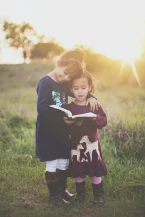Forgiveness & Peace Tales

Defining Moments in Our Lives: Joyous or Heartbreaking
Life is full of defining moments that can be both joyous and heartbreaking. It’s these moments that shape us into the person we become, and sometimes, they can even lead to manifesting a miracle through the choices we make.
One of the most heartbreaking moments in my life was when I lost someone I loved dearly. The sudden, senseless death of an innocent, unarmed human being was overwhelming, and the total confusion I felt as I tried to absorb this new, hideous reality brought my life to a crashing halt.
It was one of the hardest things I’ve ever had to do, but I knew I had to call the mother of the person I lost and tell her that she would never see her child again. How do you find the words to tell a mother that she will never hear her child’s laugh or give them a hug again?
But even in deep trauma and tragedy, there can be a spark of clarity. In my case, I downloaded a realization in my meditation that there were victims at both ends of the gun. While it was easy to see that my loved one was a victim of someone else, it was a little more complicated to see that they were also a victim of society.
As a member of society, I believe we are all responsible for the society we’ve created. Children killing children is not a mark of a civil society, and that’s why I founded the Tariq Khamisa Foundation to stop kids from killing kids by breaking the cycle of youth violence.
Our mandate at the foundation is to save lives, enable the right choices, and teach the principles of nonviolence, empathy, compassion, and forgiveness. We believe that violence is a learned behavior, but so is nonviolence. It’s up to us to teach it to our children because they won’t learn it through osmosis.
I know firsthand the power of forgiveness. It changed the young man who took the life of someone I loved, and it changed me too. It allowed me to extend goodwill to the person responsible and find peace in my heart.
I hope my story inspires others to believe that peace is possible, and we can all work together to create a more compassionate and loving society.
Manifesting a Miracle by Making the Right Choices
As humans, we face defining moments in our lives that can either be joyous or heartbreaking. It is during these moments that we have the opportunity to make the right choices and manifest a miracle by using the support of others.
One tragic defining moment in my life happened when my only son was lured to a bogus address by a youth gang and was shot and killed during their gang initiation. The sudden loss of an innocent, unarmed human being brought my life to a crashing halt, and I was overwhelmed with grief and confusion.
However, in the midst of my deep trauma and tragedy, I found a spark of clarity during my two-hour daily meditation practice as a Sufi Muslim. I came to realize that there were victims at both ends of the gun. While it was easy to see that my son was a victim of the 14-year-old who shot him, it was more complicated to see that he was also a victim of the American society we live in.
This realization led me to start the Tariq Khamisa Foundation, with the goal of breaking the cycle of youth violence and teaching the principles of nonviolence, empathy, compassion, and forgiveness to children. I believe that violence is a learned behavior, and if we can teach children the principles of nonviolence, they can unlearn it.
Through the foundation’s various programs, we have been able to save lives, enable kids to make the right choices, and teach them the principles of nonviolence. We have been able to cut suspensions and expulsions by 70 percent, a huge achievement that showcases the effectiveness of our methods.
As we move forward, we must remember that manifesting a miracle by making the right choices requires the support of others. We must take responsibility for the society we have created and work together to create a more peaceful and loving world.
The Sudden, Senseless Death of an Innocent Human Being
Life can be unpredictable, and sometimes it takes an unexpected turn that can leave us feeling devastated. It was one such defining moment in the life of a father, who lost his only son to a senseless act of violence. His son was a university student, kind, generous, and had a bright future ahead of him. He had aspirations to work for National Geographic and was engaged to a beautiful lady. But all of that was shattered in an instant when he was lured to a bogus address by a youth gang and shot dead in a gang initiation.
The death of an innocent, unarmed human being left the family overwhelmed with grief, and it was hard for them to absorb this new reality. It brought their life to a crashing halt, and one of the hardest things the father had to do was to call his son’s mother, who lived in a different city, and tell her the devastating news that she would never see her son again.
As humans, we tend to think in binary terms, black or white, good or bad. However, in times of deep trauma and tragedy, there is a spark of clarity that can change our perspective. The father, who practices as a Sufi Muslim, meditates two hours a day, and during one such session, he realized that there were victims at both ends of the gun. It was easy to see his son as a victim of the 14-year-old, but it was a little bit complicated to see that he was also a victim of American society.
This tragic event begs the question: who is American society? We are all responsible for the society we have created. Violence and children killing children are not a mark of a civil society. It is essential to recognize our responsibility and take action to stop such incidents from happening in the future.
The Tariq Khamisa Foundation: Breaking the cycle of youth violence
The Tariq Khamisa Foundation is a non-profit organization that was established in 1995, after Tariq Khamisa, a 20-year-old college student, was fatally shot by a 14-year-old gang member while delivering pizza. The tragedy inspired Tariq’s father, Azim Khamisa, to start the foundation with the goal of breaking the cycle of youth violence and creating a safer society for all.
The foundation’s mission is to stop youth violence before it starts by educating and enabling young people to make positive choices and promoting restorative practices. The foundation’s programs are designed to teach conflict resolution, empathy, and respect, while also fostering leadership and community involvement.
One of the foundation’s signature programs is the Safe School Ambassadors program, which trains students to be leaders and positive role models in their schools. These students learn how to recognize and diffuse potentially violent situations and how to support their peers who may be struggling with issues like bullying or depression.
The foundation also works with incarcerated youth through its Juvenile Restorative Justice Program. This program helps young people take responsibility for their actions and make amends for the harm they have caused. By promoting healing and reconciliation, the program helps break the cycle of violence and create a more peaceful society.
Overall, the Tariq Khamisa Foundation is a powerful force for good in the world, working tirelessly to break the cycle of youth violence and create a safer, more compassionate society.
Learning Nonviolence: A Behavioral Transformation
Learning nonviolence is not just a mere idea or a theoretical concept, but it is a practical skill that can be learned and developed through consistent efforts. The path to becoming nonviolent is not easy, but it is a transformation that can change a person’s life and impact those around them positively.
Nonviolence can be learned by developing empathy, self-awareness, and communication skills. Empathy enables us to connect with others and understand their perspectives, even when we disagree with them. Self-awareness helps us understand our emotions and triggers, which can lead to better control over our behavior. Communication skills help us express our thoughts and emotions in a constructive and nonviolent manner.
Learning nonviolence requires practice and patience. It is essential to understand that nonviolence is not a passive or weak approach, but rather an active and courageous one. It requires us to be patient, tolerant, and persistent in our efforts.
Moreover, learning nonviolence is not limited to individuals; it can be practiced by communities, institutions, and nations. The transformative power of nonviolence can bring about positive changes in society by breaking the cycle of violence and promoting peaceful coexistence.
In conclusion, learning nonviolence is a behavioral transformation that can be achieved by anyone through consistent efforts. It is a practical skill that can positively impact our lives and those around us. By developing empathy, self-awareness, and communication skills, we can grow a culture of nonviolence that can bring about positive changes in our society.
Transforming Pain through Forgiveness
Forgiveness is a powerful tool for healing, and it can be a difficult path to take, especially when someone has caused us tremendous pain. However, forgiveness is not about excusing the wrong done to us or forgetting the pain. It is about freeing ourselves from the anger, resentment, and bitterness that can consume us if we hold on to our hurt.
In this story, a mother shares her journey of forgiving the young man who killed her son. It was a long and challenging journey that required a great deal of inner strength and courage. But, by choosing to forgive, she was able to let go of her anger and pain and open up to the possibility of transformation and healing.
Forgiveness is not a one-time event; it is a process that takes time, effort, and commitment. It involves acknowledging the pain, allowing oneself to feel and express the emotions that come with it, and then making a conscious decision to let go of the resentment and choose compassion instead.
Through forgiveness, we can break the cycle of anger and violence, create a more peaceful world, and transform our own lives in the process. It is not an easy path, but it is a powerful one, and it has the potential to bring about profound and lasting change.
Teaching Children the Benefits of Meditation, Peacefulness, and Empathy
As a parent, it’s essential to instill positive values in your children. One of the best things you can teach them is how to meditate, be peaceful, and interact empathetically. Meditation has numerous benefits for children, including reducing stress and anxiety, improving focus and attention, and increasing emotional regulation. Children who meditate also tend to have better self-esteem and a more positive outlook on life.
In addition to meditation, teaching children to be peaceful can help them develop a more compassionate and empathetic worldview. Encouraging children to resolve conflicts peacefully rather than resorting to violence can help reduce aggression and hostility. It’s important to teach children how to communicate effectively, listen actively, and compromise to find solutions that work for everyone involved.
Empathy is another essential skill that children need to learn. Empathy involves the ability to put oneself in someone else’s shoes and understand their thoughts, feelings, and perspectives. Teaching children empathy helps them develop a greater understanding of the world around them, improves their social skills, and helps them build stronger relationships with others.
In summary, teaching children to meditate, be peaceful, and interact empathetically can have significant positive impacts on their well-being and social development. By instilling these values in your children, you are giving them valuable tools to navigate the world with kindness and compassion.
The Power of Sustained Goodwill, Friendship, Trust, Empathy, Compassion, and Peace
In life, we all face challenges and obstacles that can make us lose sight of the goodness in the world. It can be easy to become cynical or jaded, especially in today’s world where negativity seems to be all around us. However, it is important to remember that there is still much good in the world, and that we can all do our part to spread positivity and kindness.
One of the most powerful ways to do this is through sustained goodwill, friendship, trust, empathy, compassion, and peace. These are not just lofty ideals or abstract concepts - they are tangible actions that we can all take in our daily lives. Whether it’s being kind to a stranger, forgiving someone who has wronged us, or simply listening to a friend in need, every small act of kindness has the potential to make a big impact.
Through sustained efforts to grow these qualities, we can build stronger and more meaningful relationships with others, and create a ripple effect of positivity that can spread far and wide. We can break down barriers and overcome divisions, and work towards a more peaceful and harmonious world.
Of course, this is easier said than done. It can be difficult to maintain a positive attitude in the face of adversity, and it can be challenging to extend empathy and compassion to those who have hurt us. However, it is precisely in these moments that we must remember the power of sustained goodwill, friendship, trust, empathy, compassion, and peace.
Ultimately, it is up to each of us to do our part to make the world a better place. By growing these qualities in ourselves and spreading them to others, we can help create a brighter and more hopeful future for all.
Conclusion
Reflecting on the stories shared in this article, it becomes clear that defining moments in our lives can have a profound impact on our beliefs, values, and behaviors. From moments of joy and heartbreak to acts of forgiveness and sustained goodwill, these experiences shape who we are and who we become.
While we cannot control every event in our lives, we can choose how we respond to them. Whether it is choosing to forgive, learn from a mistake, or grow empathy and compassion, the choices we make have the power to transform our lives and the lives of those around us.
Perhaps the most important lesson we can take away from these stories is that even in the face of adversity, there is always hope. Through love, kindness, and a willingness to learn and grow, we can overcome even the most challenging of circumstances and create a brighter future for ourselves and those we care about.
















